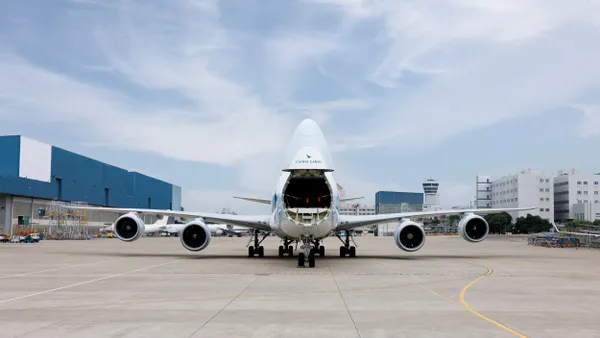Dive Brief:
- The British International Freight Association (BIFA), a group consisting mainly of freight forwarders, called out the container shipping's practice of imposing sulfur reduction surcharges as "unjustified."
- On Monday, Maersk Line sent a letter to customers announcing it will institute a "bunker adjustment factor" (BAF) beginning Jan. 1, 2019 determined by the average price of bunker fuel in different marine hubs, along with other factors. The surcharges range from $90 to $1,050 per standard container based on fuel prices and route.
- "While the shipping operators may say the new BAFs are needed to cover the cost of switching to low sulfur fuels or fitting exhaust 'scrubbers,' rises of this magnitude are unjustified and could be construed as blatant profiteering by shipping lines determined to exploit the situation,” said Robert Keen, BIFA Director General in a news article on BIFA's website.
Dive Insight:
Shippers were already hypersensitive to fuel surcharges before Maersk's letter hit inboxes on Monday.
According to Drewry Maritime Consultants, shipping lines have seen a 20% rise in fuel costs since the start of the year, which has led lines to enact new operational surcharges on short notice, with unclear methodology and little notice.
Maersk's most recent move is a reaction to a new regulation from the International Maritime Organization (IMO), designed to decrease sulfur pollution from shipping by capping the sulfur content of fuel at 0.5% globally by 2020 — a significant reduction from the current 3.5% cap.
Shipping lines can do this either by installing "scrubbers" that clean ship exhaust without requiring a change of fuel, or by using costlier fuels with lower sulfur content.
Niels-Henrik Lindegaard, head of Maersk Oil Trading, told Reuters that it plans to invest in scrubbers for "a limited number" of its 750 container vessels, but that changing fuels is the more practical solution. The changes could cost Maersk $2 billion, according to FreightWaves.
BIFA objects not only to the surcharges coming into play, but also the fact that Maersk is collecting them a full year before the new standards go into effect. The same BIFA article said that the organization would prefer any necessary increases to be incorporated into rate adjustments as opposed to surcharges.
"BIFA members are now faced with the task of explaining yet another surcharge to their customers, and what the rationale behind it is. The sulphur surcharge is bound to be extremely unpopular," said Keen.














